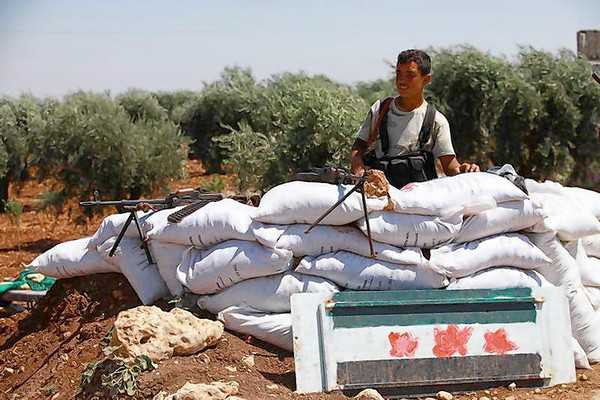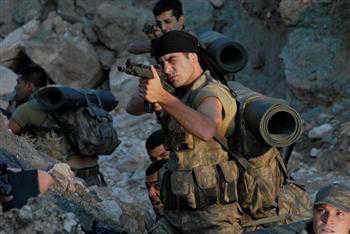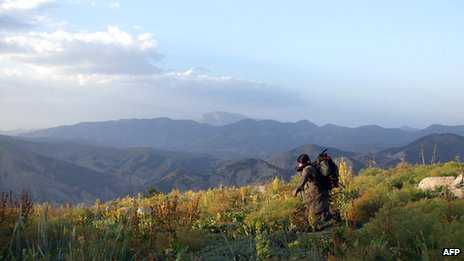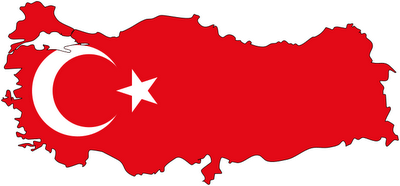By Guney YildizBBC Turkish
This image shows a PKK fighter in the Turkish mountains
Rebels of the Kurdistan Workers Party (PKK) have begun leaving south-eastern Turkey for their main bases in northern Iraq, but there is no talk of disarmament yet.
Instead, several top commanders of the PKK have said they will keep and even consolidate their forces.
So what will the thousands of well-trained militants in Qandil, Zap and other PKK-controlled areas of northern Iraq do, as the truce with Turkey holds?
This is probably the question the Iranian and Syrian governments have been asking since the imprisoned leader of the PKK, Abdullah Ocalan, who is negotiating a peace deal with Turkey, urged militants to withdraw from inside Turkey.
The group has two sister parties in Iran and Syria with their own armed wings: the Party of Free Life of Kurdistan (PJAK), which is fighting against Iran, and the Democratic Union Party (PYD), which holds the reins of power in Kurdish areas of Syria. Both have many fighters from Turkey’s Kurdish areas.
“Iran’s main concern is whether the PKK fighters will be joining forces with PJAK or not,” says Mehdi Talati, a Swiss-based Iranian security analyst.
“PJAK, with its current strength, does not represent a strong challenge to the Iranian army, but it could pose a significant threat with reinforcements from the PKK.”
Surprise
Only two years ago, Iran and Turkey were conducting joint military operations against the PKK’s main bases in the Qandil Mountains.
Prof Nader Entessar of the University of South Alabama in the US argues Iran was taken by surprise by the peace process in Turkey: “The Iranian government doesn’t appear to have foreseen this and developed a plan B for this situation yet; we may say that they were caught off-guard.”
A ceasefire has been in place between the PKK’s Iranian offshoot and Tehran since the autumn of 2011.
Although the PKK has shown its resilience in the face of joint military operations from Turkey and Iran, the group has sought to avoid fighting on two fronts whenever it can.
PKK executive leader Murat Karayilan has tried hard to establish a ceasefire between PJAK and Iran in order to focus on the fight against Turkey.
He recently reiterated that he would like to see the truce between PJAK and Iran continue.
However, Abdullah Ocalan has talked about the possibility of PKK militants joining forces with the PYD and PJAK.
“I don’t believe that our guerrilla force will [cease being active] when we withdraw – there are Syria and Iran,” he was quoted as saying in leaked meeting notes with three MPs of the pro-Kurdish BDP, who went to meet him at Imrali Prison where he is being held.
Backfiring
Another potential loser in a peace deal between the PKK and Turkey could be Syria.
The PKK
- The PKK took up arms against the Turkish state in 1984, demanding greater autonomy for Turkey’s Kurds, who are thought to comprise up to 20% of the population
- Since then, some 40,000 people have died in the conflict
- It is regarded by Turkey, the US and European Union as a terrorist organisation because of its attacks on Turkish security forces and civilians
Syria’s policy towards the PKK has fluctuated over the last decades.
Seeing the PKK as a counterbalance against Turkey, the late President Hafez al-Assad harboured the group up until 1998, when his government forced the PKK leader out of the country under pressure from Turkey and the US.
Relations between Turkey and Syria became friendlier in the following years, and Assad’s son and incumbent president, Bashar, reiterated Syria’s full support for Turkey’s war with the PKK.
In a bid to retaliate against the shifting position of the Syrian government, Abdullah Ocalan decided, in the last few days of his stay in Syria, to establish a separate Kurdish group to fight against the Syrian government.
This move now gives Mr Ocalan one of his strongest cards in Imrali prison as he negotiates a peace deal with Turkey.
The PYD, re-established in 2003 after the failure of the first attempt, now holds the reins of power in most of the Kurdish areas of Syria.
Turkey is keen to see the PYD step up the fight against Syria, and some think they can count on Mr Ocalan to influence the Syrian Kurd position towards Turkey and the Syrian government.
The co-chair of the PYD, Saleh Muslim Muhammed, told BBC Turkish in London: “Ocalan is not only the leader of the PKK. He is a leader of the Kurdish people as well. We cannot overlook his opinions.”
“Start Quote
Iran may be the only country left with a Kurdish problem”
Mehdi TalatiIranian security analyst
The Syrian government’s hitherto friendly relations with Turkey came to an end in 2011, when the Turkish government declared its open support for the Syrian rebels.
In the face of the rebel uprising, Syrian government forces pulled out of Kurdish areas in the north to concentrate on the fighting elsewhere.
This move was based on the premise that de facto Kurdish autonomy on the Turkish border would pose a challenge to the Turkish government.
But that premise could turn out to be false if a Turkish peace deal with the PKK holds.
Boost for Turkey
Saleh Muslim Muhammed confirms that the Kurds in Syria have been watching the peace negotiations between the PKK and Turkey with high hopes.
“We are ready to talk to Turkey without any conditions and we begin to see indications of a change in the Turkish policy towards us,” he said.
The conflict with the PKK has effectively challenged Turkey’s regional ambitions, especially last year when the militants held ground in Turkey’s south-eastern corner for a couple of weeks.
Now a halt in the conflict could mean Turkey would be able to free up its military and economic resources and this would result in an increase in Turkey’s regional profile, says Mr Talati.
On the economic front, the conflict has cost Turkey more than $300bn (£194bn), according to official figures.
Mr Talati adds: “It is too early to decide whether the Turkish government is honest about a political solution to the Kurdish question. But if it reaches its intended conclusion, then Iran may be the only country left with a Kurdish problem.”






